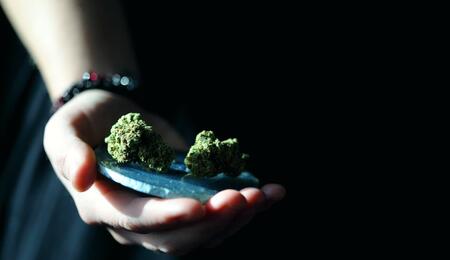Weed, Juveniles, and the Justice System

Even with legalization in place, young people continue to be summoned to court or end up in detention because of cannabis. Like alcohol laws, the laws on recreational marijuana do not permit use for anyone under the age of 21. What this country needs, among other things, is better laws on youth decriminalization.
The main reason why young people should not consume cannabis is that it may affect brain development. Several studies have shown that heavy use of cannabis among youths, especially products high in THC, may lead to a decrease in cognitive abilities that lasts into adulthood. Teens who use marijuana also face more risks of developing mental health issues like depression and poorer performance at school and university.
However, prohibiting young populations from using marijuana doesn't stop them from doing so. Just as an example, in 2018, approximately 31 percent of California high school students reported having ever tried cannabis. Nearly 15 percent said they had used marijuana in the past month.
Despite the number of marijuana-related arrests and tickets having dropped since recreational use was legalized in California, the number of defendants of color remains disproportionately high. There are some alarming discrepancies if you look at data from cities like San Diego, where 30% of the population identifies as Hispanic or Latino and less than 6% percent as Black. Latino San Diegans made up nearly half of all juvenile citations for cannabis between January 2017 and October 2019, and the youngest throughout the cases were aged 6 and 9. Moreover, Blacks accounted for 16 percent of all juvenile citations and 29 percent of all adult arrests.
The most common charge for adults was possessing more than an ounce of cannabis, which in California can result in a jail sentence of up to six months. The most common charge among children and young people was bringing cannabis onto school grounds, which usually results in counseling and community service.
Colorado legalized cannabis even earlier than California. There too, youths quite often end up in court because of cannabis-related offenses. According to state data, Colorado had a total of 1,034 cannabis-related cases during the 2019-2020 academic year, the majority of which were court summons, but 31 of the cases also resulted in imprisonment.
A study published in JAMA Pediatrics in 2019 maintains that cannabis legalization (for those of legal age) doesn't reduce arrests for youths, nor that youths benefit from decriminalization policies introduced with legalization. Although there is an opportunity with decriminalization to downsize the number of youth arrests, research shows that there's no significant development in this direction. In fact, what we see in many cases is quite the opposite, an increase in policing and unfortunately criminalization of youths.
It would make no sense that legalization carries the risk of more criminal penalties for youngsters, something which can affect a person for the rest of their lives. Youth criminalization is a systematic part of legalization policies. It's the part of the legislation that tries to limit access to drugs and discourage young people from using drugs, but its big failure is to see the problem through the lens of public health. And things get even more frustrating if considered various other studies that affirm that adult-use legalization of cannabis does not lead to more use or access among the youth.

Are Drug-Free Zones Part of the Problem?
There are several other policy issues. The existence of drug-free school zones appears to be one of them. As a policy, drug-free zones date back to the Nixon administration. The law was later revisited to encompass drug-free zones also around public housing, parks, churches, and other facilities.
These zones are what make it possible for the number of drug-related offenses among juveniles to remain very high year after year. The zone policy was introduced to enhance existing penalties for drug use. Many states maintain legal schemes that result in two sentences for a single offense. For example, if a young person, and even an adult, is caught possessing cannabis on their person, they violate the law on cannabis possession and the law on drug-free school zone.
Very often, these zones go well beyond the area of the school. For example, in Memphis, Texas, over 40 percent of the urban area used to be covered by drug-free school zones as recently as 2020 when a bill was signed to cut down the school zones from 1,000 to 500 feet.
Drug-free school zones were conceived out of the fear that youths could access drugs. In some states, they are enforced with a "zero tolerance" policy which can mean being suspended or expelled from school, which could in turn ruin the young person's future. Even scarier, in terms of incarceration, many jurisdictions do not make a legal distinction between young and adults when the arrest is being conducted.
The system in place is further designed to keep on punishing the youths. Mandatory drug treatment programs are often said to be an alternative to incarceration, and in many cases, young convicted people indeed choose the program over serving time in prison. However, the effectiveness of rehabilitation programs is known to be fairly low, and there's the cost of participating in it which must be taken care of by the youths and their families or legal guardians.
Can Juvenile Policies Be Improved?
There's certainly room for improvement. First, it's important to stop seeing this as a problem within the frame of the criminal justice system. Instead, see it as an issue of public health with an end goal of raising well the new generations.
A legal solution may be offered by the example of New Jersey and its legislature, or more precisely, bill S3565. This piece of law dictates that a first offense involves parental notification of underage possession of cannabis. If a second offense happens, the police need to provide information about community services like counseling and mentoring. In the case of a third offense, police must make referrals to the designated community service program or initiative.
It may not be the perfect piece of legislation (if perfect exists at all) because the police are sort of again asked to take the role of social workers, but the good thing is that nowhere in the bill is there a mention of incarceration or a summon to the court. The bill also says that should a student come to school carrying goods that they are not supposed to, they will have to go through the school's disciplinary system instead of involving law enforcement.
This is a relatively new bill, and it will take some time to see its effect in practice. But at least someone is doing something different than simply referring youngsters to courts and jails as if they were adults, sometimes even for laughable deeds.









